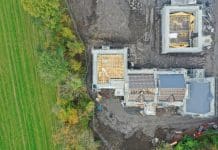It’s vital for those who are tendering or bidding for new projects to understand how MMC and social value can benefit their business, no matter where they sit within the supply chain, explains Robert Walton, Managing Director of Constructionline
Most of those working in the construction industry will have heard of the terms ‘social value’ and ‘modern methods of construction’ (or ‘MMC’), as they have become industry buzzwords in recent years. However, both MMC and social value are much more than just trends – they are both transforming the way construction projects are tendered for, won and executed.
What is social value?
When companies create social value, they change communities for the better. The UK Green Building Council (UKBC) categorises social value under three broad themes: jobs and economic growth; health, wellbeing and the environment; and strength of community.
In practice, what ‘social value’ looks like will typically change from one job to the next, as it’s important for construction companies to consider what is needed most within the community their project is located in. If they’re working in an area of high unemployment, for example, the best way to provide social value may be to create jobs for local people, while if they’re working in a built-up, polluted environment, the community may get the most benefit from the company focusing on reducing the carbon emissions associated with their project.
Shaping the future of construction
Public sector buyers have been required to think about how they can secure social value when commissioning public services contracts since 2013 when the Social Value Act first came into force. In June 2018, guidelines were strengthened further when the Government began to explicitly evaluate social value when awarding major contracts. And since January 2021, all bidders on public sector projects have been required to set out what they will deliver in terms of social value, as well as details on how they will deliver it, under the Social Value Model. Their response accounts for at least 10% of their score when it comes to bid evaluations.
At Constructionline, we have seen how the public sector’s growing emphasis on social value has influenced both public and private sector supply chains. When we first launched our social value question set, 2.4k suppliers were verified within the first four weeks, and we now have 10k verified members.
The Government has also taken steps to encourage the uptake of MMC since 2013 when it set a target of achieving a 33% reduction in the cost of construction and a 50% reduction in the overall time taken to deliver projects by 2025. In December 2020, they published the Construction Playbook, which set out how the government will work with the construction industry to ‘build back better’. The Playbook outlines the Government’s commitment to aggregating and standardising public sector demand in order to increase the use of MMC throughout the construction industry. In the 2021 Budget, they also announced plans to launch an MMC taskforce, backed by £10m of seed funding.
With both MMC and social value set to change the way construction companies work over the coming years, it’s vital for forward-thinking companies to consider how they will incorporate both of these trends into their strategies.
Finding social value in MMC
As these two trends begin to collide, construction companies are finding that in many ways, MMC and social value go hand in hand perfectly, with modern methods of construction naturally creating social value.
In projects where the majority of the manufacturing process is carried out off-site, for example, time spent on-site is minimal, which reduces the impact of construction on the local community. The environment also benefits from off-site construction, as on average, there are up to 90% fewer vehicle movements, which reduces transportation emissions. And as the modular building process takes place within a quality-controlled factory environment, there’s less waste and greater efficiency, which further contribute to a lower environmental impact. On average, it takes 67% less energy to produce a modular building than a building constructed using traditional methods.
Offsite manufacturing facilities are also typically located in some of the most deprived areas of the country, which means that by using offsite manufacturing in their projects, construction firms can create jobs in the areas where they are needed most. By creating jobs within a factory, rather than contracting for a specific project, firms are also creating long-term jobs in a permanent facility, rather than a fixed-term job that ends when the project is completed.
Providing stand-out social value
With social value becoming an increasingly important requirement at every stage of the supply chain, however, construction companies cannot simply rely on MMC as their only way of creating social value. It’s those companies that go above and beyond that stand out to both public and private sector clients, so both buyers and suppliers must focus on building the social value they provide through their own actions and through their partnerships.
For suppliers, it’s important to think about how they can provide social value within the community that they are delivering the project in. While offsite construction can be an excellent way to create jobs in areas of the country that struggle with high unemployment, public sector buyers will usually want to see how suppliers will make the local community a better place. This means that suppliers must think about how they can provide local benefits – perhaps they could offer apprenticeships to local college students, for example, or commit to creating a new park in close proximity to their project.
Suppliers must also ensure that they are fully showcasing the social value that they have created on past projects as well as the social value they could create on the project they are bidding for. We find that suppliers are often concerned that they don’t have enough examples of social value to help them to stand out when it comes to winning new work, but many suppliers have more to talk about in terms of social value than they might think. Our social value question set covers a wide range of areas, including equability, diversity and inclusion (EDI); working conditions; mental wellbeing; gender pay gap and community engagement. On average, Constructionline Supplier members can demonstrate social value in at least three areas.
And for buyers, finding suppliers who are also making social value a priority is key. It’s important for the buyer to find ways for their own organisation to deliver social value – they may decide to pay all of their workers the Living Wage, for example, or decide to train employees to become Mental Health First Aiders to better support their workers’ mental wellbeing. But by searching for suppliers that are also providing social value, buyers can multiply the social value each of their projects provides, delighting clients and communities alike.
No room for compromise
As buyers and suppliers seek to win new work by adopting MMC and creating social value, it’s also crucial for all parties to ensure that they don’t lose sight of the essential elements required to impress any client or buyer. Factors such as compliance, health and safety and quality continue to heavily influence the awarding of any public or private sector contract.
Offsite construction can provide greater protection for employees’ health and safety, as it’s typically easier for risks to be identified and mitigated within a factory environment than on-site. The factory setting can also improve quality control, resulting in a higher quality output – in fact, a survey of those who have adopted MMC found that over half (57%) have seen improved quality of work.
Similarly to social value, however, buyers and suppliers can’t rely on MMC alone to provide them with the health and safety and quality credentials they will need to secure new opportunities. Suppliers must keep a close eye on their compliance certificates and renewal dates to ensure that they are fully compliant at all times so that they’re ready to seize new opportunities whenever they arise. And buyers must seek suppliers that can meet all of their requirements – those whose track record for health and safety, quality and compliance are just as strong as their social value credentials.
As we move towards a future in which construction companies will be challenged to provide high quality, safe and compliant buildings and social value for local communities within increasingly short timescales, it’s clear that MMC can play a critical role in helping buyers and suppliers to win new work. Those that adopt modern methods of construction early, and maintain the fundamental factors of health and safety, compliance and quality that are key to winning any tender, are set to thrive now and in the future.













